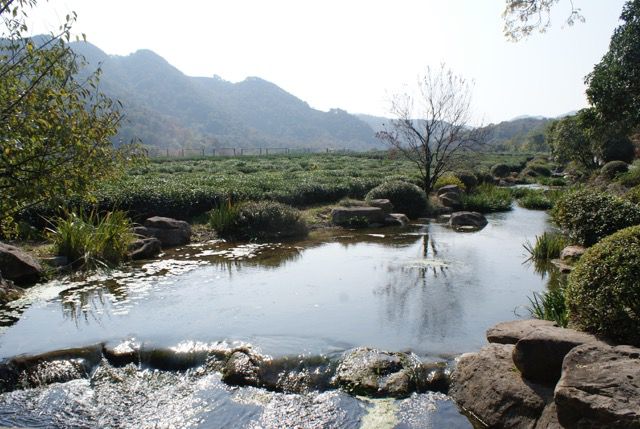course
New Course with Craig Mitchell in June 2023 in Berlin
A Clinical Approach to the Shang Han Lun through Abdominal Diagnosis
In this course, we will begin by learning a traditional methodology for abdominal palpation specifically focused on the application of herbal formulas, primarily from the Shang Han Lun. This approach, known as kanpo, originated in Japan, but has become widespread in recent years. Following an orientation to abdominal palpation, course participants will learn how to understand the information gleaned through the exam. Using case histories and reference to the original source texts, we will explore a method for using the abdomen to inform our understanding of the Shang Han Lun and then use the Shang Han Lun to help us understand the abdomen. During this two-day course, we will have time for palpation practice, in-depth discussion, and case analysis. Participants are encouraged to bring cases to the course for class discussion.
Instructor: Craig Mitchell, MS, PhD (China), has been practicing East Asian medicine since 1993. His co-translation of the Shang Han Lun (On Cold Damage) is widely recognized as an important work advancing modern understanding of this foundational text. Craig has been seeing patients, teaching, and writing for the last 30 years. For the last 20 years, he has been involved with the Seattle Institute of East Asian Medicine, as a teacher and director. Through his more than 20 years of teaching, Craig has developed an ability to explain difficult concepts in understandable language and to bring the medical insights of the Han Dynasty forward into the modern era.
Date: 17./18. Juni 2023
Instructor: Craig Mitchel, MS, PhD (China), Chinese Medical Doctor
Venue: TCM Practice Ramune Fischer, Grellstraße 32, 10409 Berlin Prenzlauer Berg.
In case the number of partcipants should exceed 12 persons, we will find another room.
Teaching hours: Sat 10-18:30 und Sun 10-16 Uhr, Saturday 1 ½ hours noon break, Sunday 1 hour noon break. That's 12 hours teaching time.
Course fee for 2 days: 320 €
For registration or inquiry, please mail to
The written basis of our courses are the German or English translation of Huang Huang’s textbook:
In German:
Huang Huang: Die Klassischen Rezepturen der Chinesischen Medizin in der modernen Praxis, Verlag: Müller & Steinicke
In English:
Huang Huang´s Guide to Clinical Application of Classical Formulas
You could order both books online at:
We recommend you to get one of these books beforehand and bring it along to our class.
These books contain almost all formulas that we will discuss during our classes with their indications, contraindications and classical citations.
Subject matter that goes beyond this book is handed out to each participant. These handouts are subject to international copyright law and must not be copied or handed on to other persons without the consent of the lecturer.
Classes
The classes are held either in German or in English, depending on the location, by means of a PowerPoint presentation. Additionally, there are practical instructions regarding the diagnostic methods.
Prof. Huang Huang’s lectures will be held in Chinese and translated into either German or English, depending on the location, by his student and assistant Dr. Andreas Kalg.
The Goals of our Training Courses
With our training courses at the German Jing Fang Institute based on Prof. Huang Huang’s Jing Fang system we want to give Chinese medicine practitioners an additional method at hand, which they can immediately put into practice. Since each weekend course is a unit in itself, the things one has learned on the weekend can be instantly applied in one’s practice the very next week.
The goals that we try to achieve by our training courses are that you
- - know the constitution types,
- - know the classical formulas with their most important classical and modern indications und contraindications,
- - know how to use the classical formulas according to the constitution and the diseases of your patients.
Elements of our Basic Courses
Each basic course consists of the following elements:
- Herb constitution (constitution types according to the main herbs of each of the ten key formulas)
- Formula constitution (constitution types according to each of the major Classical Formulas)
- detailed discussion of the clinical application of each formula with all their indications and contraindications
- abdominal diagnostics, lower leg diagnostics, and other relevant diagnostics.
Certain clinical applications will be illustrated by suitable case histories.
For the full content of our basic course, please refer to our curriculum.
Structure of our Courses
1. Basic Course with Dr. Andreas Kalg
- 5 weekends courses, two formula families each weekend, i.e. one formula family a day.
2. Advanced Courses with Prof. Huang Huang or other Chinese Jing Fang physicians:
- usually one or two 4-day seminars each year
The course participants can freely choose any of the courses at any time. The basic course will be repeated over and over again at different locations. One can of course audit all the five weekend courses but one can also book a single weekend course separately. Course participants who have completed the whole basic course and at least one advanced course will receive a certificate signed by Prof. Huang Huang and the institute’s director, which proves them to be a qualified practitioner of Prof. Huang Huang’s Jing Fang style.
After the basic training we will offer possibilities to study the Jing Fang even in more depth. Therefore we want to invite renowned Jing Fang physicians from China, Japan, and the US.
Courses on Huang Huang’s Jing Fang System
In our Jing Fang courses we impart hands-on knowledge on the classical Chinese medical formulas from the Zhang Zhongjing’s works Shang Han Lun and Jin Gui Yao Lue. The formulas from these two medical classics are called Classical Formulas (Jing Fang).
Prof. Huang Huang has developed a very practicable system of constitution types that makes it easy to use the Classical Formulas effectively and save in clinical practice. This is a unique system which explains the otherwise hard to grasp Classical Formulas in an immediately plausible way. It enables the students to use these ancient formulas right away in their clinical practice.
Starting off from the main herbs of each of the ten key formulas, Prof. Huang Huang has described herb constitution types. In his second step, he has described constitution types for each of the major Classical Formulas. By means of analyzing the constitution type of a patient and matching it with his disease, one can find a suitable formula. This we call the therapeutic triangle, i.e. the connection of the person with his specific constitution with his disease and the suitable formula.
Course
Curriculum
Curriculum oft he Basic Course of the German Jing Fang Institute
1st Weekend Course:
1st day: The Cinnamomum (gui zhi) constitution and the formulas of the der Cinnamomum formula family:
- Gui Zhi Tang
- Gui Zhi Jia Fu Zi Tang
- Xiao Jian Zhong Tang
- Gui Zhi Jia Long Gu Mu Li Tang
- Dang Gui Si Ni Tang
- Wen Jing Tang
- Zhi Gan Cao Tang
- Ling Gui Zhu Gan Tang
- Ling Gui Zao Gan Tang
- Wu Ling San
- Gui Zhi Fu Ling Tang
- Gui Zhi Shao Yao Zhi Mu Tang
2nd day: The Bupleurum (chai hu) constitution and the formulas of the der Bupleurum formula family:
- Da Chai Hu Tang
- Xiao Chai Hu Tang
- Chai Gui Tang
- Chai Hu Jia Long Gu Mu Li Tang
- Si Ni San
- Xue Fu Zhu Yu Tang
- Jing Jie Lian Qiao Tang
- Chai Hu Gui Zhi Gan Jiang Tang
- Chai Hu Gui Zhi Tang
2nd Weekend Course:
1st day: The Pinellia (ban xia) constitution and the formulas of the der Pinellia formula family:
- Xiao Ban Xia Tang
- Xiao Ban Xia Jia Fu Ling Tang
- Ju Pi Zhu Ru Ling Tang
- Wen Dan Tang
- Huang Lian Wen Dan Tang
- Ban Xia Hou Po Tang
- Ban Xia Xie Xin Tang
2nd day: The Astragalus (huang qi) constitution and the formulas of the der Astragalus formula family:
- Huang Qi Gui Zhi Wu Wu Tang
- Huang Qi Jian Zhong Tang
- Fang Ji Huang Qi Tang
- Yu Ping Feng San
- Bu Yang Huan Wu Tang
3rd Weekend Course:
1st day: The Ephedra (ma huang) constitution and the formulas of the der Ephedra formula family:
- Ma Huang Tang
- Ma Huang Jia Zhu Tang
- Ma Xing Shi Gan Tang
- Yue Bi Jia Zhu Tang
- Xiao Qing Long Tang
- Ma Huang Fu Zi Xi Xin Tang
2nd day: The Gypsum (shi gao) constitution and the formulas of the der Gypsum formula family:
- Bai Hu Tang
- Bai Hu Jia Ren Shen Tang
- Zhu Ye Shi Gao Tang
- Xiao Feng San
4th Weekend Course:
1st day: The Rheum (da huang) constitution and the formulas of the der Rheum formula family:
- Da Cheng Qi Tang
- Xiao Cheng Qi Tang
- Tiao Wei Cheng Qi Tang
- Tao He Cheng Qi Tang
- Da Huang Zhe Chong Wan
- Xia Yu Xue Tang
- Yin Chen Hao Tang
- Fang Feng Tong Sheng San
- Da Huang Fi Zi Tang
2nd day: The Aconite (fu zi) constitution and the formulas of the der Aconite formula family:
- Gui Zhi Jia Fu Zi Tang
- Si Ni Tang
- Si Ni Jia Ren Shen Tang
- Zhen Wu Tang
- Fu Zi Xie Xin Tang
5th Weekend Course:
1st day: The Coptis (huang lian) constitution and the formulas of the der Coptis formula family:
- Huang Lian Jie Du Tang
- Jing Jie Lian Qiao Tang
- Huang Lian Tang
- Xiao Xian Xiong Tang
- Xie Xin Tang
- Huang Lian E Jiao Tang
- Xiang Lian Wan
- Zuo Jin Wan
2nd day: The Zingiber (gan jiang) constitution and the formulas of the der Zingiber formula family:
- Li Zhong Tang
- Fu Zi Li Zhong Tang
- Da Jian Zhong Tang
- Gan Jiang Ling Zhu Tang










